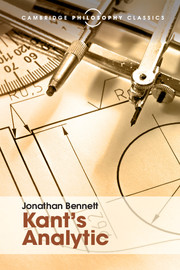7 - The Categories considered
from Analytic of concepts
Published online by Cambridge University Press: 05 July 2016
Summary
Concepts and language
In essaying an analytic salvage of something from the Metaphysical Deduction, our first bother is that we do not know what to analyse. I have adopted Kant's equation of ‘x has concepts’ with ‘x can make judgments’, and his assumption that if x makes a judgment then x could express it in a language. These are both wrong. To ‘make a judgment’ in Kant's sense is to think or believe that something is the case, and in this sense judgments are often made by creatures which have no language. We say, not as a joke or a metaphor, that the scampering dog thinks that its master is holding a bone; and Kant gives no reason for eschewing this kind of talk.
On the other hand, there is little work for ‘concept’ to do outside the realm of language. To credit a rat with a concept of triangularity because it reacts selectively to triangles is to take a word which serves well as an imprecise technical tool in certain linguistic contexts, and to press it into a different service whose connection with its normal work is at best obscure. The formula ‘A concept is a recognitional capacity’, though wide enough to cover the uses of ‘concept’ both in animal psychology and in philosophy, omits most of what is important in the philosophers’ use of the word. Until we have a clearer view of how linguistic behaviour relates to selective responses to kinds of stimulus, we ought to restrict the word ‘concept’ to the tasks which we know it will perform. This is not a claim about what rats cannot do, but merely a counsel of caution about the use of the word ‘concept’.
I therefore agree with Kant that creatures which lack a language lack concepts, though not for what seems to be his reason, namely that creatures which lack a language cannot make judgments. I wish to go further in this direction, and say that a creature cannot have concepts unless its language is of a certain special sort. If someone's linguistic behaviour consisted solely in applying words to presented bits of the world, so that he never made general statements and thus never gave reasons for what he said, what questions could we usefully raise about his concepts?
- Type
- Chapter
- Information
- Kant's Analytic , pp. 89 - 104Publisher: Cambridge University PressPrint publication year: 2016
- 1
- Cited by



